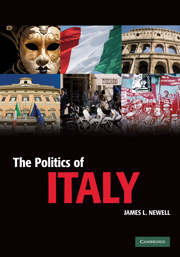Book contents
- Frontmatter
- Contents
- List of figures
- List of maps
- List of tables
- List of boxes
- Acknowledgements
- List of abbreviations
- Chronology
- Map 1 Italian regions and major cities
- Introduction
- I Historical background
- II The polity: structures and institutions of the regime
- III Politics: citizens, elites and interest mediation
- 5 Political culture and behaviour
- 6 Interests and interest mediation: voluntary associations and pressure groups
- 7 Elections, voting and political parties
- IV Policies and performances
- Appendix: The electoral system for the Chamber of Deputies and the Senate
- References
- Index
6 - Interests and interest mediation: voluntary associations and pressure groups
Published online by Cambridge University Press: 05 August 2012
- Frontmatter
- Contents
- List of figures
- List of maps
- List of tables
- List of boxes
- Acknowledgements
- List of abbreviations
- Chronology
- Map 1 Italian regions and major cities
- Introduction
- I Historical background
- II The polity: structures and institutions of the regime
- III Politics: citizens, elites and interest mediation
- 5 Political culture and behaviour
- 6 Interests and interest mediation: voluntary associations and pressure groups
- 7 Elections, voting and political parties
- IV Policies and performances
- Appendix: The electoral system for the Chamber of Deputies and the Senate
- References
- Index
Summary
Introduction
In chapter 4 we discussed the distribution of power and influence over policy between legislature, political executive and bureaucracy. We argued that, generally speaking, in democracies bureaucracies have a power resource in the policy-making process that is less readily available to the other two actors. This is one that derives from their interaction with interest groups whose co-operation must often be secured in the formulation and implementation of policy.
In chapter 5, we saw that a very influential strand of thinking in political science associates interest groups (and associations more generally) with social capital. On the one hand, social capital makes it possible for people to organise for their mutual benefit. On the other hand, organisation generates social capital since interaction generates norms of reciprocity. Meanwhile, co-operation builds on the self-reinforcing character of trust, making it more likely that people display the behaviour that demonstrates empirically that their fellows were correct to trust them in the first place. In turn, it is thought that the capacity of interest groups to generate social capital enhances democracy because the reciprocity, co-operation and trust such groups sustain allow self-interest to be pursued in a way that is alive to the interests of others, that is ‘“enlightened”, rather than “myopic”’ (Putnam, 1993: 88).
The concerns of the last two chapters therefore throw a spotlight on the concerns of this one, namely:
(1) What contribution do interest groups make to democracy in Italy?
(2) Do they enhance or diminish democracy in that country?
- Type
- Chapter
- Information
- The Politics of ItalyGovernance in a Normal Country, pp. 179 - 209Publisher: Cambridge University PressPrint publication year: 2010

